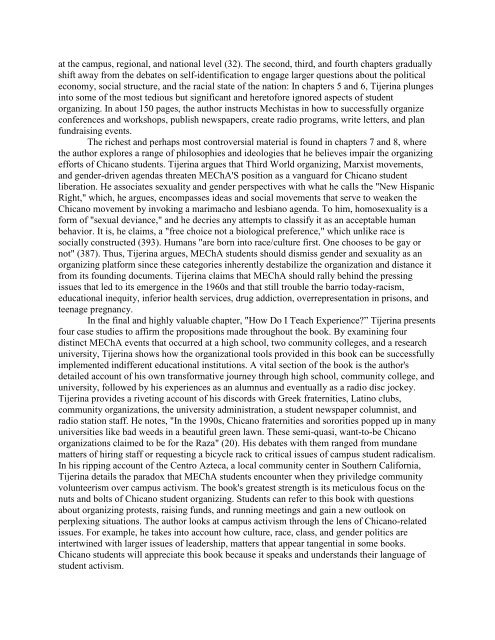MECHA LEADERSHIP MANUAL: HISTORY ... - Roberto Tijerina
MECHA LEADERSHIP MANUAL: HISTORY ... - Roberto Tijerina
MECHA LEADERSHIP MANUAL: HISTORY ... - Roberto Tijerina
You also want an ePaper? Increase the reach of your titles
YUMPU automatically turns print PDFs into web optimized ePapers that Google loves.
at the campus, regional, and national level (32). The second, third, and fourth chapters gradually<br />
shift away from the debates on self-identification to engage larger questions about the political<br />
economy, social structure, and the racial state of the nation: In chapters 5 and 6, <strong>Tijerina</strong> plunges<br />
into some of the most tedious but significant and heretofore ignored aspects of student<br />
organizing. In about 150 pages, the author instructs Mechistas in how to successfully organize<br />
conferences and workshops, publish newspapers, create radio programs, write letters, and plan<br />
fundraising events.<br />
The richest and perhaps most controversial material is found in chapters 7 and 8, where<br />
the author explores a range of philosophies and ideologies that he believes impair the organizing<br />
efforts of Chicano students. <strong>Tijerina</strong> argues that Third World organizing, Marxist movements,<br />
and gender-driven agendas threaten MEChA'S position as a vanguard for Chicano student<br />
liberation. He associates sexuality and gender perspectives with what he calls the "New Hispanic<br />
Right," which, he argues, encompasses ideas and social movements that serve to weaken the<br />
Chicano movement by invoking a marimacho and lesbiano agenda. To him, homosexuality is a<br />
form of "sexual deviance," and he decries any attempts to classify it as an acceptable human<br />
behavior. It is, he claims, a "free choice not a biological preference," which unlike race is<br />
socially constructed (393). Humans "are born into race/culture first. One chooses to be gay or<br />
not" (387). Thus, <strong>Tijerina</strong> argues, MEChA students should dismiss gender and sexuality as an<br />
organizing platform since these categories inherently destabilize the organization and distance it<br />
from its founding documents. <strong>Tijerina</strong> claims that MEChA should rally behind the pressing<br />
issues that led to its emergence in the 1960s and that still trouble the barrio today-racism,<br />
educational inequity, inferior health services, drug addiction, overrepresentation in prisons, and<br />
teenage pregnancy.<br />
In the final and highly valuable chapter, "How Do I Teach Experience?” <strong>Tijerina</strong> presents<br />
four case studies to affirm the propositions made throughout the book. By examining four<br />
distinct MEChA events that occurred at a high school, two community colleges, and a research<br />
university, <strong>Tijerina</strong> shows how the organizational tools provided in this book can be successfully<br />
implemented indifferent educational institutions. A vital section of the book is the author's<br />
detailed account of his own transformative journey through high school, community college, and<br />
university, followed by his experiences as an alumnus and eventually as a radio disc jockey.<br />
<strong>Tijerina</strong> provides a riveting account of his discords with Greek fraternities, Latino clubs,<br />
community organizations, the university administration, a student newspaper columnist, and<br />
radio station staff. He notes, "In the 1990s, Chicano fraternities and sororities popped up in many<br />
universities like bad weeds in a beautiful green lawn. These semi-quasi, want-to-be Chicano<br />
organizations claimed to be for the Raza" (20). His debates with them ranged from mundane<br />
matters of hiring staff or requesting a bicycle rack to critical issues of campus student radicalism.<br />
In his ripping account of the Centro Azteca, a local community center in Southern California,<br />
<strong>Tijerina</strong> details the paradox that MEChA students encounter when they priviledge community<br />
volunteerism over campus activism. The book's greatest strength is its meticulous focus on the<br />
nuts and bolts of Chicano student organizing. Students can refer to this book with questions<br />
about organizing protests, raising funds, and running meetings and gain a new outlook on<br />
perplexing situations. The author looks at campus activism through the lens of Chicano-related<br />
issues. For example, he takes into account how culture, race, class, and gender politics are<br />
intertwined with larger issues of leadership, matters that appear tangential in some books.<br />
Chicano students will appreciate this book because it speaks and understands their language of<br />
student activism.


